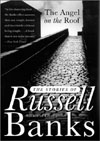
Russell Banks' new collection hauntingly strafes old territory
by John Sewell
Almost any author of note tends—usually after acquiring a modicum of commercial acceptance—to have their early works reprinted in various configurations, serving to introduce new readers to past glories and to cast a new spin on the author's creative evolution. So it's no surprise that after the bestselling Cloudsplitter and film adaptations of The Sweet Hereafter and Affliction, Russell Banks' publishers would see fit to release a retrospective short story collection. The paperback edition of The Angel on the Roof: The Stories of Russell Banks (Perennial/Harper Collins, $15) compiles 31 of Banks' short pieces.
As with his novels, the bulk of the stories in Angel are set in New Hampshire. The area's seemingly endless winters provide an excellent milieu for Banks' cast of desperate and angry loners who find isolation—either by choice or by happenstance—in the working class recesses of small town life.

Many of the stories compiled in Angel come from one of Banks' earliest and best short story collections, Trailer Park, a loosely interwoven group of tales about the inhabitants of a trailer camp in northern New Hampshire. The trailer park residents seem to have allowed life to happen to them instead of commandeering their fate. Social ineptitude and economic necessity have relegated these lost souls to a bleak existence that breeds depression, alcoholism and resentment of middle class life.
In the trailer park, Banks creates an archetype that will resurface throughout his career: the angry working class (and usually male) loser. These characters aren't pretty or even likable—but they certainly are compelling. And Banks presents them, warts and all, with stark, monochrome clarity.
The stories compiled in Angel are rife with dejected characters. And the angry loner type reaches full flower in the form of Nelson Painter, protagonist of "Firewood." His life then was loud and boisterous and quarrelsome most of the time, "a goddamned pressure cooker, he called it, but not all bad, surely not as bad as his first wife said and as he thought then, though he was not wrong to leave her and the kids, for another woman, who doesn't fight him so hard all the time, who seems to like him better than his first wife liked him."
There are striking similarities between Nelson Painter and the protagonists of Banks' novels Hamilton Stark (1978) and his masterpiece, Affliction (1992.) Painter, Stark and Affliction's Wade Whitehouse all seem cut from the same sheaf of coarse, soiled burlap. Though Banks presents each character with unflattering clarity, there is a degree of empathy. Readers can easily perceive that while it's probably best to avoid men like these, they're all products of a harsh upbringing and a legacy of male violence. And when Banks depicts these damaged characters, he's at his best.
It seems that every Banks character finds a corner of desolation, though not all to such an extreme. Another denizen of the trailer park, Merle Ring, revels in the solitude found fishing from a tiny enclosure over a frozen lake in "The Fisherman." Ring is another variation of the usual Banks male: self-centered, oblivious, and self-righteous in his refusal to follow the path of the mainstream. Like Stark, Ring has an iconoclastic vision, tough not nearly as self-destructive.
All of the male characters in Angel are not squatting on desolation row. "Sarah Cole: A Type of Love Story" is told in first person from the perspective of Ron, a narcissistic lawyer involved with a homely woman (Sarah Cole), just for the power trip of it all. Through the voice of Ron, Banks portrays the ugly inner life of an outwardly attractive person.
But don't get the impression that Banks is using the exact same template with only slight variations throughout Angel. In "Indisposed," Banks totally shifts gears with a female protagonist, an ambiguous setting (though surely not modern) and an omniscient perspective, telling the story of an abused woman who turns the tables on her oppressive husband.
All told, Angel serves as a reminder of Banks' primary strengths as a writer. The short story form suits Banks perfectly. The narrative style follows a linear path where the words flow effortlessly. Banks speaks volumes in the form of brief parables that illustrate the truths of ordinary lives while avoiding the pitfalls of grandiosity—a lesson that might have been lost in Banks' most recent, sprawling historical novel, Cloudsplitter.
This is not to say that Banks should limit himself to only writing short stories about brooding loners in New Hampshire. But The Angel on the Roof does reminds us how a few well-chosen words can deal great force. Great edicts are made memorable by brevity, and the brute authority of Banks' moral compass is best in a concentrated form.

June 21, 2001 * Vol. 11, No. 25
© 2001 Metro Pulse
| 




